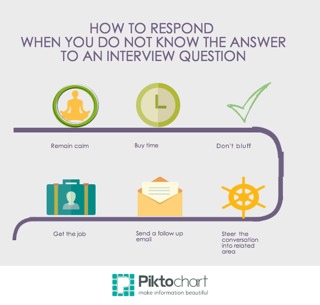How to respond when you do not know the answer to an interview question
By: Together Abroad 29-01-2015
Categories:* Search tips,

The thought of being stumped for a response during a long awaited interview is one of the most difficult positions any candidate can find themselves in and the failure to respond appropriately or to navigate the proper response with skill can indeed have negative consequences for the entire interview process.
Preparing in advance for the interview will help ease anxiety and increase the chances of navigating the interview process however, there will most likely be interview questions which will cause some level of discomfort.
Here are some tips on how to respond should you find yourself in such situations.
-
Remain calm:
Don’t break out in a sweat as this will reflect in your body language. If you do not understand the question ask the interviewer to rephrase the question or to provide further clarity. Do not immediately blurt out that you do not know the answer. Perhaps you may not have understood the question and all that maybe required is some more insight into what the interviewer is trying to achieve. -
Buy Time:
Do not be in a hurry to respond. Give your brain time to think. Ask follow up questions and give your mind time to seek out possible responses. This will also offer more clarity and provide another angle from which to approach the problem. -
Don’t bluff:
Don’t try to make up an answer or to wing it. You will come across as inauthentic and the recruiter will be able to spot this. Rather admit that while you are not familiar with that subject matter, you are able to do the needful to seek out the solutions required. You may then proceed to talk about how you might go about getting an fitting solution. The interviewer is not only interested in the content of your response but also how you respond to the question as it provides an insight on how you deal with challenging situations. -
Steer the conversation to a related area
You may also wish to steer the conversation to an area that you are familiar with and that is linked to the job you seek to fill. Tell the interviewer what you do know within the remit of the subject area and highlight any links to the question that was asked. -
Send a follow up email.
A good final approach would be to research a proper response and include that as part of your follow up correspondence to the recruiter. You may phrase it in such a way that is comes across as additional insights you would like to share based on your previous discussion.
Every recruiter knows that perfect candidate does not exist. You are not expected to have all the answers on the spot. What you would like to demonstrate is an ability to think critically and show resourcefulness even in the face of difficult situations.
Evasiveness and ambiguousness will only be counterproductive. You want to leverage on what could be a disadvantage and turn it into a positive by showing how you can respond appropriately in times of stress and pressure.
Good luck in your job search!
By:Tamkara Adun